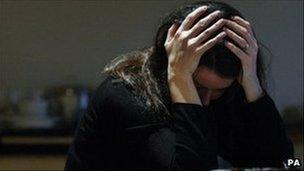Legal reforms 'could help reduce domestic abuse levels'
- Published

Crimes such as domestic abuse or rape often occur without independent witnesses
Proposed legal reforms could significantly help reduce the level of domestic abuse, according to one of Scotland's most senior prosecutors.
Solicitor general Lesley Thomson QC believes removing corroboration requirements would protect victims.
The recommendation, from a senior judge, is still to be debated by MSPs.
Ms Thomson will tell a conference in Edinburgh on Wednesday that corroboration often proves a real obstacle in bringing cases to court.
It is regarded as a cornerstone of Scots law and means one piece of evidence must be backed up by another.
But the solicitor general said domestic violence, like rape, typically occured where there were no independent witnesses.
Fair trial
She said: "It cannot be acceptable in a modern legal system that in order to bring criminal proceedings in cases which typically occur in private, we are left in the hands of fortune as to whether or not there happens to be corroboration."
She will tell the Domestic Abuse in Scotland conference that prosecutors must ensure a fair trial for those accused of committing domestic abuse. But she said victims also had rights.
"It is necessary that such rights are protected by an effective system for the prevention, investigation and prosecution of crime," she said.
"In such a system, prosecutions with evidence of a perfectly good quality to convince a sheriff or jury of an accused's guilt should not founder on the basis of an antiquated technical requirement, heralding from centuries before a woman could vote, own property or give evidence in criminal proceedings."
A review headed by the <link> <caption>senior judge Lord Carloway</caption> <altText>Carloway Review</altText> <url href="http://www.scotland.gov.uk/About/CarlowayReview" platform="highweb"/> </link> recommended in November 2011 that the requirement for corroboration should be removed from Scottish criminal trials.
He wrote: "It is an archaic rule that has no place in a modern legal system where judges and juries should be free to consider all relevant evidence and to answer the single question of whether they are satisfied beyond reasonable doubt that the accused person committed the offence libelled."
His report said abolition would bring Scots law into line with modern thinking on how to approach evidence in criminal cases.
The Scottish government said it was considering a package of measures including the abolition of the corroboration requirement, and would begin a consultation process shortly.
- Published22 May 2012
- Published13 December 2011
- Published28 March 2012